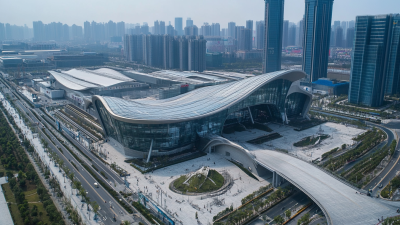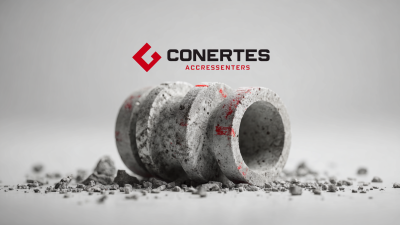What is Concrete Delivery and Why It Matters for Your Construction Project
Concrete delivery is a critical component of any construction project, serving as the backbone for structural integrity and overall project success. According to the National Ready Mixed Concrete Association (NRMCA), concrete accounts for over 70% of the total volume of construction materials used in various projects, underlining its importance in the industry. Efficient concrete delivery not only ensures that projects remain on schedule but also helps in maintaining quality standards essential for durability and safety. A well-implemented concrete delivery system minimizes waste and reduces costs, contributing to the overall profitability of construction endeavors. With the concrete market projected to reach $1 trillion by 2027, understanding the intricacies of concrete delivery becomes vital for stakeholders aiming for successful project outcomes.

What is Concrete Delivery and Its Role in Modern Construction Projects
Concrete delivery plays a crucial role in modern construction projects, serving as the backbone of many structures. According to the National Ready Mixed Concrete Association (NRMCA), ready-mixed concrete accounts for about 75% of total concrete consumption in the U.S., with more than 290 million cubic yards delivered annually. This highlights the significant reliance on efficient concrete delivery systems, which influence timelines, quality, and overall project success.
The logistics of concrete delivery involve meticulous planning and coordination. Factors such as the distance from the mixing plant to the job site, traffic conditions, and the specific requirements of the project can impact both the timing and quality of the delivery. For instance, the American Concrete Institute (ACI) suggests that delays in concrete delivery can lead to issues like reduced workability and increased risk of cracking. As a result, ensuring timely and accurate concrete delivery not only supports the structural integrity of the project but also adheres to industry standards, maximizing both efficiency and profitability.
Understanding the Key Components of Concrete Delivery Services
Concrete delivery services play a crucial role in the construction industry, ensuring materials are available when needed and at the required quality. Understanding the key components of this process is essential for any successful construction project. It encompasses several layers, including logistics, scheduling, and communication among suppliers, contractors, and site managers. Effective management of these components can prevent delays and reduce costs, which are vital in a competitive market where demand often fluctuates based on economic conditions.
The law of supply and demand greatly influences concrete delivery services. When demand for construction materials rises due to increased building projects, the price of concrete can be affected, making it essential for stakeholders to navigate these economic shifts adeptly. Innovations in sustainable building materials are reshaping this landscape, driving a demand for high-performance options that fulfill modern construction standards. Companies that efficiently integrate delivery services with innovative solutions will not only meet client needs but will also position themselves favorably in a rapidly evolving market.
What is Concrete Delivery and Why It Matters for Your Construction Project
| Component | Description | Importance | Delivery Methods |
|---|---|---|---|
| Concrete Mix | The specific blend of ingredients used to create concrete. | Affects strength, durability, and set time of the concrete. | Ready-Mix, Site-Mix |
| Delivery Timing | The scheduled time for concrete to be delivered at the site. | Critical for project scheduling and quality. | Just-in-time delivery |
| Transportation | How concrete is transported from production to the site. | Ensures fresh concrete arrives without delays. | Mixer trucks, Pumping equipment |
| Quality Control | Measures to ensure concrete meets specified standards. | Reduces risk of structural failure. | Testing, Certifications |
| Site Preparation | Readiness of the site to receive concrete. | Ensures proper placement and compaction. | Site review, Accessibility planning |
The Impact of Timely Concrete Delivery on Project Efficiency and Cost
Timely concrete delivery is a critical factor in the overall efficiency of construction projects. When concrete is delivered on schedule, it allows construction teams to adhere to their project timelines and avoid costly delays. Delays in concrete delivery can lead to a domino effect, causing subsequent phases of the project to be pushed back, which may result in increased labor costs and potential penalties for failing to meet deadlines. Furthermore, waiting for concrete can idle essential machinery and personnel, effectively wasting valuable resources.
In addition to impacting time schedules, the timing of concrete delivery can affect overall project costs. When concrete is not delivered when expected, contractors may need to rent equipment for longer periods or pay overtime wages to their workers to catch up on lost time. Additionally, any delays might prompt the need for expedited shipping or additional resources to keep up with project demands, further inflating costs. Therefore, ensuring reliable and timely concrete delivery is not just a logistical concern; it is a crucial element of financial planning and project management that can significantly influence the final budget of a construction project.
Impact of Timely Concrete Delivery on Project Efficiency and Cost
How Concrete Quality Affects Overall Project Outcomes and Durability
When it comes to construction projects, the quality of the concrete used can significantly influence the overall outcome and durability of the structure. High-quality concrete ensures that the final product can withstand environmental stresses and time without compromising structural integrity. Factors such as mix design, water-to-cement ratio, and curing practices all play pivotal roles in determining concrete quality. Poor quality concrete can lead to defects, costly repairs, and even project delays, affecting not only the budget but also the project's long-term success.
**Tip:** Always source your concrete from reputable suppliers who prioritize quality control and provide consistent materials. This includes checking certifications and adhering to industry standards during production.
Additionally, the timing of concrete delivery is crucial. Delays can result in temperature variations that might affect the curing process, leading to weaker concrete. It’s essential to coordinate closely with your concrete supplier to ensure timely delivery and proper handling on-site.
**Tip:** Plan your construction timeline wisely, allowing for adequate curing time before stressing the concrete. This can prevent issues such as cracking and enhance the lifespan of the structure.

Best Practices for Selecting a Reliable Concrete Delivery Provider
When embarking on a construction project, selecting a reliable concrete delivery provider can significantly impact the outcome. A trustworthy provider ensures timely delivery and adherence to the project schedule, which is crucial for maintaining workflow and preventing costly delays. To find the right concrete delivery service, consider their reputation in the industry. Look for providers with positive customer reviews and testimonials, as these can offer insights into their reliability and service quality.

In addition to reputation, assess the provider's range of services and concrete mix options. A competent provider should offer customized solutions tailored to your project's specific needs, whether it involves ready-mix concrete, decorative options, or special blends. Moreover, inquire about their equipment and technology. Modern batching plants and delivery systems can enhance efficiency and consistency in the concrete delivered, ensuring that your project receives the highest quality material. Establishing open communication with your provider is also essential; this fosters collaboration regarding timelines, logistics, and any potential hurdles that may arise during the project.
Related Posts
-

5 Best Strategies for Efficient Concrete Delivery Services
-

Top 10 Concrete Specialty Manufacturers from China at the 137th Canton Fair
-

How to Choose the Best Concrete Products for Your Global Supply Needs
-

Innovative Trends in Landscaping and Concrete for 2025 The Ultimate Guide for Global Buyers
-

Embracing Innovation in the Future of Concrete Accessories Solutions
-

Unveiling the Technical Specifications of the Best Concrete Specialties for Optimal Performance
